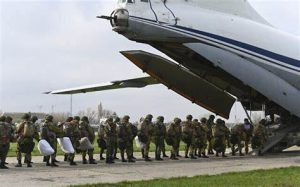
Staff Writer
Vladimir Putin on Wednesday announced the withdrawal of some troops, which were previously stationed on the Russian-Ukrainian border, comprising part of the 100 000-troop build-up, which lead to many believing that Moscow was about to intervene in Ukraine. Calling it a defeat for Europe and US, without even any fire having been spent, Moscow maintained that it never sought to intervene, and that its troop build-up on the Ukrainian border, was part of military exercises, vowing that those conducted with Belarus would continue.
NATO, the US and Ukraine all welcomed the gesture, but cautioned that the number of troops withdrawn were minimal, and that Moscow still possessed the capacity to attack Ukraine at short notice. Meanwhile, Russia continues to illegally occupy the Crimean Peninsula, and supports separatists in Eastern Ukraine.
Speaking to Radio Islam International, Professor Andre Thomashausen, former director of UNISA’s Centre for Comparative law, argued that Putin’s claim of victory was mainly since Germany, on Monday, concurred that Ukraine would not be allowed to join NATO. He said, “Well, the victory actually occurred yesterday with the visit of the German chancellor, Olaf Scholz, who had the day before [Monday] stated at a meeting in Kiev (Ukraine), “Explain to the Ukrainians that their becoming NATO members is not on the table”.”
Professor Thomashausen also noted the routes of the impasse, in Russia’s perception of encirclement, following NATO’s expansion Eastward. The issue of missile deployment and missile defence, which theoretically allowed NATO members to attack Moscow without much fear of consequence, was significant. The Professor said, “The problem is that the new NATO members next to the Russian border have strike capacity… missile systems that can strike the big cities of Russia in a matter of minutes, and most importantly, anti-missile systems, like the American Patriot and Thad systems, that make it impossible for Russia to retaliate. So, should Russia be attacked and should it then fire its own missiles, they will be intercepted by these Patriots systems, and that makes it a very small risk for NATO to maybe, one day, attack.”
Professor Thomashausen also noted that it was likely that the North Stream 2 pipeline would become operational, since Germany had already invested too much into the project, and that the EU and Germany would not be bullied into purchasing American gas, which was five times more expensive. In his opinion, Russia’s incorporation into the EU, NATO and Europe, more broadly, was the best possible outcome for the continent and world. Significantly, in this regard, he argued that the country was a democracy, in that it supposedly had an independent judiciary and recurring democratic elections, but that this was different to South Africa.







0 Comments